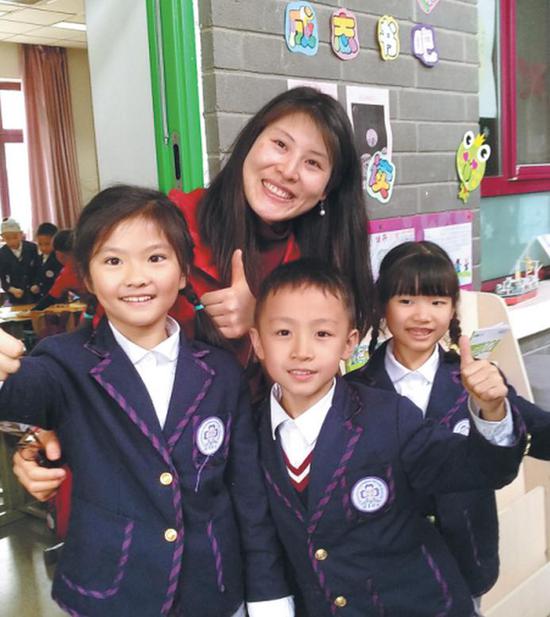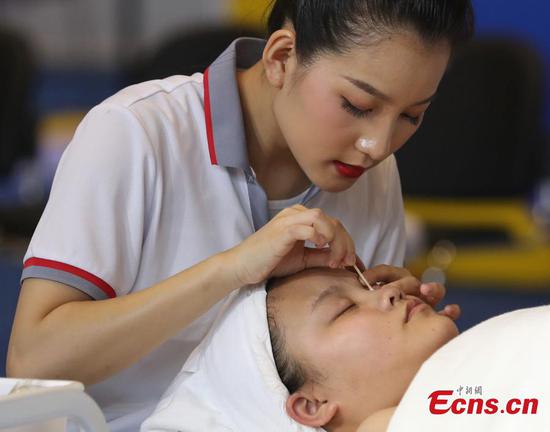
Wang Jing, English teacher of second-graders at the Tsinghua-affiliated elementary school, poses with students. (Photo provided to China Daily)
"The parents worry about academic performance. Not at just one period of time, it's all the time. The parents of elementary school children worry about whether they can go to a good junior high school. Junior high school parents worry about high school. And high school parents worry about whether their kids can go to a good college."
Liu said that "because academic performance is pretty much the only indicator of success, every parent disregards what the real strengths of their kids are. They just look at the test scores. They actually discourage the development of kids in any other direction other than the tests."
She said changes in the schools lead to better relationships among students, teachers and parents. "One of the segments in the positive education curriculum is to ask the kids to go home to talk to the parents about three good things that happened each day. And we ask the parents to list three good things that happened to them.
"It turned out that this intervention improved, first, the kids' confidence and, second, how the parents look at their kids," Liu said.
In China, "if a child has good academic performance, then of course the parents love you," she said. "Otherwise, they will blame you or scold you, say you are stupid. This even affects the relationship between the father and mother. So after this intervention was done for one semester, they found the children became more confident and the relationships between the students and the parents, and between the parents and the school, were much better."
"Interestingly," Liu added, "the relationship between mother and father became much better, too."
Scientific studies of schools that implemented positive education in China and elsewhere found that a curriculum that builds the well-being of the students improves academic performance.
For example, the Zengcheng district of Guangzhou, Guangdong province, which launched a large positive education program in 2014, found that the percentage of graduating students admitted to key universities rose from 28 percent to 41 percent by 2017. At the same time, suicides were reduced from seven to one. Similarly, the 19th Middle School in Beijing (which teaches grades seven to 12) saw its percentage of graduates admitted to first-class universities rise from 70 percent to 75 percent in three years after implementing a positive education program.
The Himalayan country of Bhutan conducted an experiment in which some schools implemented a positive education curriculum focusing on building life skills. Other schools were a control group that retained the old curriculum. The conclusion was that students who received the positive education saw their standardized test performance increase by roughly the equivalent of a full academic year, compared with the control group. In addition, an analysis by a Loyola University of Chicago psychology professor and colleagues of 213 experimental studies concluded that students who receive positive education training see an average increase of 11 percent in their test scores.
Peng Kaiping, professor of psychology and dean of the School of Social Sciences at Tsinghua University, emphasizes that positive psychology is based on testable conclusions, not vague feelings. Psychological research found that individuals can use technology and training to improve their positive emotions and their feelings of living meaningfully, Peng said.


















































